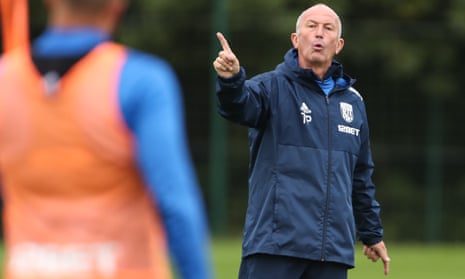Match day four of our debut Premier League season at Brighton and on Saturday we’re up against what is widely known in football as a “Tony Pulis team”. For some that reference to West Bromwich Albion and their manager is not a positive one. For me, however, it’s about as great an accolade as it gets for a football coach.
Why? Last week I discussed teams changing system and identity from game to game and the lack of consistency in terms of performance you risk from that. It’s something you can never level at a “Tony Pulis team”.
I often hear negative comments made about the style of football Pulis plays and, while I understand people who complain about the way he sets his teams up – reliant on strong defensive structure and being a constant threat from set plays – as a budding young coach/player with aspirations to manage at the highest level I can’t help but admire the fact every team he has managed have a strong identity and mirror his footballing philosophy.
As a 16-year-old schoolboy I used to watch Tony’s training sessions at Bristol City, a club he managed while I was coming through the ranks and every day, rain or shine, he would go through his players’ positioning as a unit and work on detailed set plays to the finest detail until every single player knew exactly where he wanted them in every single moment of a match. He coached his own style of play and in turn made the players accountable for their performances owing to his extreme diligence on the training field. You got the odd complaint by players about the boredom of these repetitive practices but what they couldn’t say was that they didn’t know what was expected of them.
It was a real learning curve for me to discover what true coaching was about and I promise you I haven’t had many coaches or managers in my career able to organise and coach their teams with the same clear tactical ideas he has done for the last two decades. My ideas on football are not the same as his nor do I completely agree with his style of play, but what I have taken from his sessions and from watching his teams is that in order to gain consistent results you must be consistent in your process.
Whether it was Rory Delap’s long throws on a narrow pitch at Stoke or the reliance on set-play deliveries from Chris Brunt towards an extreme aerial threat of his physically imposing West Brom team, we all know when you play against his side you need to come off the pitch with cuts and bruises if you are to overcome their approach.

It doesn’t matter if you enjoy watching that kind of industrial football or not. What you can’t argue with is that throughout his career he has stuck to his footballing principles, which are the foundation of what he believes in, and in turn he has produced consistent results in the Premier League. It’s one of the great levellers of the beautiful game that from managers in the Premier League to supporters talking about the game in the pub, every one of us has a contrasting opinion on what we see as good football.
There are so many different ways to play, systems to use and playing philosophies to implement with and without the ball but it’s managers like Pulis – with his distinct style at one end of the spectrum – or Pep Guardiola at the other that allow us to analyse and compare team performance critically and analytically. It gives us a measure of where the game is at and how we can innovate and progress.
I truly respect the managers who defend their idea of how the game should be played and consistently coach their teams individually and collectively to play their way. We often talk about the fact there are so few British managers plying their trade in our top tier but how many teams coached by a homegrown manager can you actually watch and say their side have a clear, consistent and distinct methodology of play?
At Brighton on Saturday we know that for us to be able to get three points we are going to have to be able to compete tactically and physically against a strong, hard-working “Tony Pulis team”.
I hope when he hears his team described that way it’s taken as the highest compliment because that terminology denotes the fact his side are well coached and completely mirror his philosophy.
And that’s why I will always admire and respect him as a coach, regardless of style of play, and why one day I dream of my own side being labelled a “typical Liam Rosenior team”.

